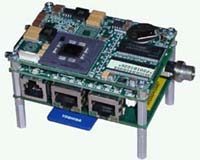 Opera is when a guy gets stabbed in the back and, instead of bleeding, he sings. --Ed Gardner General Micro Systems Announces Industry's Smallest Single-Board Computer General Micro Systems, a leading supplier of VMEbus and CompactPCI board-level products and systems, today announced the Spider, the world's smallest single-board computer (SBC). Occupying 30% less space than a credit card, and consuming as little as 4W of power, the Spider's tiny footprint, standalone operation and hot swappability makes it ideal for a broad range of embedded applications, from distributed control systems and scalable telecom blade servers, to handheld computing, in-flight entertainment and defense/homeland security.  The question, though, is: Can I Quake and Bake with it? STORServer Unveils the World's Largest Capacity Backup Appliances STORServer, Inc. -- manufacturer of the all-in-one enterprise Backup Appliance -- announced today that it is shipping its latest line of backup recovery solutions. The new K-Series models utilize the latest in tape technology from Qualstar to provide the largest capacity backup appliances in the world. What Differentiates Linux from Windows? Microsoft reacts to marketing pressure to make design decisions favoring running a few processes faster but then finds itself forced first to layer in backward compatibility and then to engage in a patch-and-kludge upgrade process until the code becomes so bloated, slow and unreliable that wholesale replacement is again called for. New Evidence Suggests Early Oceans Bereft Of Oxygen For Eons As two rovers scour Mars for signs of water and the precursors of life, geochemists have uncovered evidence that Earth's ancient oceans were much different from today's. Enigma Of Uranus Solved At Last Uranus has puzzled scientists ever since the probe Voyager 2 did a flyby in 1986 and found that its magnetic field appeared to break the planetary rulebook.  Hubble images Uranus with several rings and two moons in view Space Station Research Yields New Information About Bone Loss A new NASA-funded study revealed how bone loss increases the risk of injuries, highlighting the need for additional measures to ensure the health of spacecraft crews.The study provides new information about bone loss caused by prolonged spaceflight. The study is in the online version of the Journal of Bone and Mineral Research. 
|
A bunch of blokes with opinions on almost anything who aren't afraid to crap on about them to the world at large.
Friday, March 12, 2004
Subscribe to:
Post Comments (Atom)

No comments:
Post a Comment